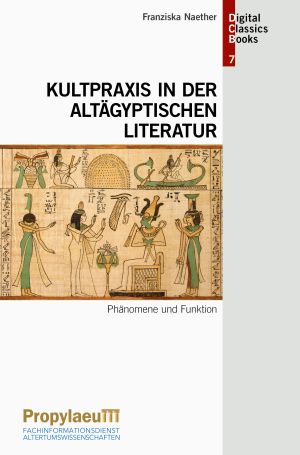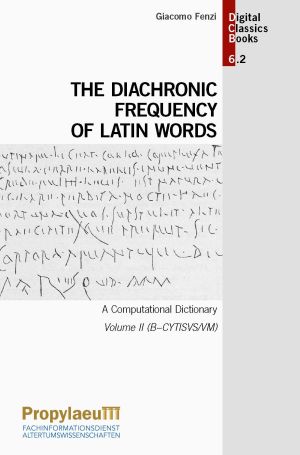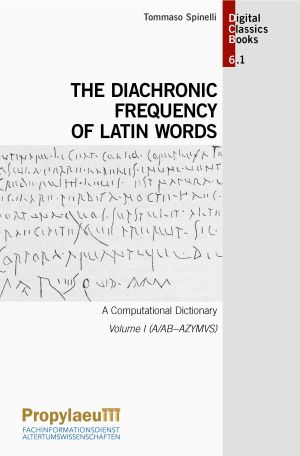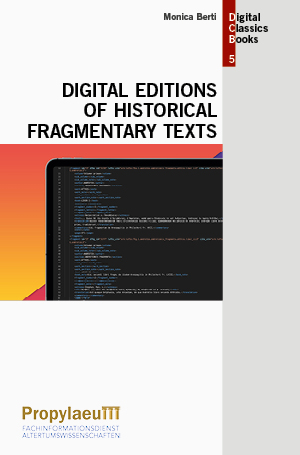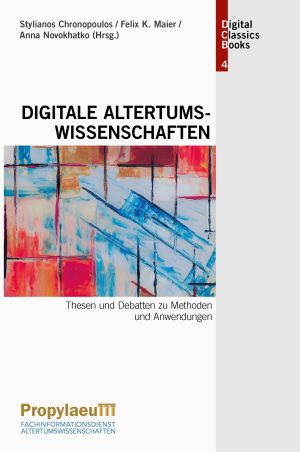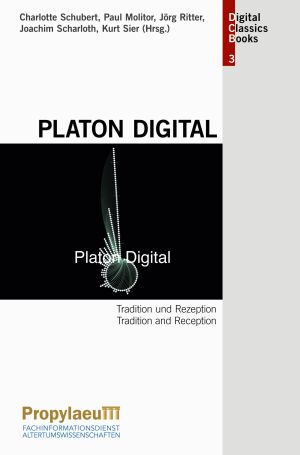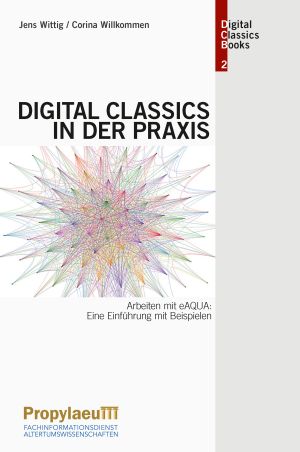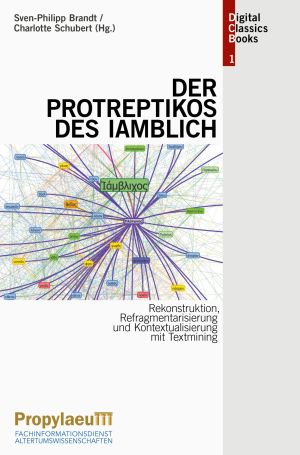Digital Classics Books
Digital Classics Books is a series of Open Access monographs which is open for contributions such as documents written as part of an academic qualification, produced in the context of a Digital Humanities project. Also eligible are more comprehensive individual works, e.g. collected volumes containing several contributions based around a common subject or theme.
Digital Classics Books publishes works on Classical Studies and related areas that apply or develop methods from the Digital Humanities.E-books are freely available for download by users. Futher reaching possibilities of electronic publishing can be realised with this form of publication, as this series allows research data to be integrated directly into the book or placed within a data repository. This provides readers not only with limited results in appendices, but with access to exported and edited versions of the complete results of research in the form of tables in the data repository.
This series allows electronic and printed publications to complement each other, as all titles are also offered as print-on-demand. Published works therefore appear simultaneously in various versions: as free digital copies (PDF or HTML versions), or as a printed book (hardback or paperback), available at a reasonable price from bookshops or online suppliers. The intention is to offer authors an interesting place to publish in addition to our e-journal Digital Classics Online which combines the requirement of the traditionally book-oriented disciplines for printed books from a publisher, with publication in a no-cost Open Access forum that conforms to our expectations
![]()
Editors
Dr. Roxana Kath
Dr. Michaela Rücker
Prof. Dr. Reinhold Scholl
Prof. Dr. Charlotte Schubert
Contact
Prof. Dr. Charlotte Schubert
Lehrstuhl für Alte Geschichte
Historisches Seminar
Universität Leipzig
Ritterstr. 12 / R. 302
D-04109 Leipzig
E-Mail: schubert@rz.uni-leipzig.de
Internet: Homepage
Coming Soon
Published so far
Kultpraxis in der altägyptischen Literatur: Phänomene und Funktion
In Ancient Egypt, numerous cult practices are attested – from various encounters with gods, demons, and death in rituals to processions, oracles, and magical spells. These cult practices also appear in literature from the Middle Kingdom (c. 2137 B.C.) to the Roman Empire (c. 3rd century A.D.) – in Middle Egyptian, Late Egyptian, and Demotic. In this book all passages of the ca. 200 narrative, instructional, and discursive literary works that mention such cult practices are analyzed in their entirety for the first time. In this volume, the following aspects are discussed: the representation of the divine; notions of divine justice and sacred jurisdiction; conceptions of destiny and future prospects; self-reflection on cult practices, including doubts and untold and secret knowledge. The book concludes with cross-cultural research perspectives with other literatures of the ancient world.
Kultpraxis in der altägyptischen Literatur: Phänomene und Funktionen
In Ancient Egypt, numerous cult practices are attested – from various encounters with gods, demons, and death in rituals to processions, oracles, and magical spells. These cult practices also appear in literature from the Middle Kingdom (c. 2137 B.C.) to the Roman Empire (c. 3rd century A.D.) – in Middle Egyptian, Late Egyptian, and Demotic. In this book all passages of the ca. 200 narrative, instructional, and discursive literary works that mention such cult practices are analyzed in their entirety for the first time. Using a dual methodology from religious studies and literary studies, the setting and content of the sources are addressed in detail.
The Diachronic Frequency of Latin Words: A Computational Dictionary : (B-C)
This book gives statistical information about the chronological development of the use of Latin words throughout the history of the language, from the fourth century BCE to the early sixth century CE. Based on the computational analysis of the works of 309 Latin authors, fragmentary and anonymous texts, and 521,532 epigraphs, this innovative resource helps scholars to explore the usage of Latin words across different time periods and linguistic registers, offering statistical insights to support philological, linguistic, and literary analysis.
The Diachronic Frequency of Latin Words: A Computational Dictionary: (A/AB–AZYMVS)
The Diachronic Frequency of Latin Words is an innovative resource that gives statistical information about the chronological development of the use of Latin words throughout the history of the language, from the fourth century BCE to the early sixth century CE. Based on the computational analysis of the works of 309 Latin authors, fragmentary and anonymous texts, and over 520,000 epigraphs, this computational dictionary helps scholars to explore the usage of Latin words across different time periods and linguistic registers, offering statistical insights to support philological, linguistic, and literary analysis.
Vol. 6.2., see
Digital Editions of Historical Fragmentary Texts
This book describes a new model for digital editions of historical fragmentary texts, i.e. texts that have been lost in their original form and survive only through citations and reuses in later works. This book describes the current state of digital libraries of fragmentary texts and presents two new related projects: the “Digital Fragmenta Historicorum Graecorum” project, which is the digital and expanded version of the Fragmenta Historicorum Graecorum (FHG), and the “Digital Athenaeus” project, which provides an inventory of authors and works cited in the Deipnosophists of Athenaeus of Naucratis with a data model for their identification and analysis.
Digitale Altertumswissenschaften:: Thesen und Debatten zu Methoden und Anwendungen
This volume introduces scholars who are not particularly acquainted with recently ongoing developments in Digital Classics to selected crucial problems and debates in the field. The selection enables the readers not only to get an all-around view of the discussed issue but also to get in contact with common main lines of discourses in Digital Classics and Digital Humanities in general. This volume offers discussions on fundamental questions and tendencies (new working methods, digital publishing, teaching and research with the usage of databases and information systems), and a specialized discussion on digital scholarly editions, which serves as an example illustrating general issues on producing and working with digitized and digital sources and material in Classics. Thus, the purpose of this volume is to be a collection of some crucial results that have been achieved, clear tendencies that dominate, envisioned possibilities, and even deadlocks, and become thus a provisory orientation point in the fast changing landscape of institutions, disciplines and methods in (Digital) Classics today.
Platon Digital: Tradition und Rezeption
Like Homer, Plato is one of the ancient authors with the richest reception from Antiquity through the Middle Ages to modern times. Nevertheless, and precisely for this reason, this tradition at best has been partially explored so far. The authors approach this old goal of research in the humanities in new ways by applying methods from computer science to Plato and his reception. To this end, innovative methods of paraphrase identification have been developed in order to establish them as a method of research in classical and cultural studies.
Digital Classics in der Praxis: Arbeiten mit eAQUA: Eine Einführung mit Beispielen
"Digital Classics in der Praxis: Arbeiten mit eAQUA. Eine Einführung mit Beispielen“ introduces into the practical work of text mining with co-occurrence search and parallel search. The book is designed as a low-threshold introduction that does not require any previous knowledge. It can therefore easily be used as a textbook for text analysis in historical-philological coursers. In a general introductory section, the tools are explained on the basis of their functionalities offered in the portal eAQUA. The co-occurrence search shows semantic connections, the search for parallel passages lists similarities between a work and an entire reference corpus of Latin or Greek literature. Dependencies, influences, tradition and transfer paths of ancient knowledge can be reconstructed with the tools. This opens up new paths for the interpretation of ancient literature.
In the second part, terms from corpus analysis and the meaning and use of significance measures are explained. A detailed glossary explains the most common terms from the Digital Humanities today.
Der Protreptikos des Iamblich: Rekonstruktion, Refragmentarisierung und Kontextualisierung mit Textmining
This book combines several articles, which analyse the Protreptikos by Iamblichus with different text mining methods. With these methods the authors try to find new aspects for the discourse in classical studies about the relationship between the Protreptikos by Iamblichus, Aristotle’s Protreptikos and Plato’s writings.
Iamblichus’ Protreptikos is concerned with Pythagoras’ theory and for that purpose he discusses philosophical trends of the classical antiquity. Hence many citations of classical philosophers can be found in the text. For this reason the authors use the citation-analysis and the cooccurrence-analysis, text mining tools provided by the portal eAQUA, and give a new perspective on citation methods in Iamblichus’ Protreptikos.





